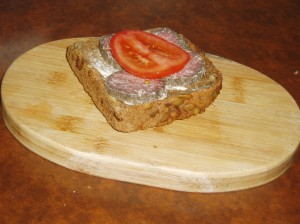The Secret of Danish Pronunciation Revealed Posted by Bjørn A. Bojesen on Apr 1, 2012 in Uncategorized
For many foreigners trying to learn Danish, the natives’ pronunciation is a tough nut to crack. How on earth do they do it? I met Henrik Jørgensen, lecturer and researcher at the Scandinavian Department at Aarhus University.
Mr. Jørgensen, you and your colleagues are rumoured to be on the scent of a brand new theory about the pronunciation of Danish?
Yes, that’s true. My curiosity was aroused at a seminar in Sweden last autumn. I noticed that one of the participants, a Czech linguist residing in Stockholm, was speaking pitch-perfect Danish. In the lunch break I was surprised to learn that he had only been to Denmark a couple of times. But what struck me most was his madpakke.
You mean his packed lunch?
Exactly. As some people may be aware, this is an important difference between Danes and Swedes: Danes usually bring their own packed lunches to school or work, while a Swede would never dream of that, as warm meals are always served at the institution. But hold on a sec, the real riveting fact was this: He was eating rugbrød sandwiches, just like any Dane would do!
Wait… You mean there is a connection between Danish rye bread and the way the language is pronounced?
To begin with, I couldn’t believe it either. The very thought reeked of prepubescent pranks. However, chance had me bumping into an expert on nutrition at a vernissage just a couple of months later. Throughout January and February we conducted an interdisciplinary survey which surprisingly seems to confirm my initial whim.
How’s that?
We had two test groups consisting of immigrants from the Mediterranean countries. There were ten persons in each group, of both sexes and between the ages of 19 and 64. During the weeks of testing, group A was ordered to follow a strict diet with a lot of rugbrød. Group B was allowed to continue their habit of eating meals without any rugbrød. At the same time, both groups were given intense Danish lessons by me and other teachers here at the Scandinavian Department. We’ve just finished evaluating the tests. The result is clear: The rugbrød eaters have achieved a much better Danish accent than the non-rugbrød eaters!
Wow, that’s incredible! How do you explain that?
The findings are still too premature to draw any firm conclusions. But one possible explanation could be what the anatomists call the ”equilibrium of muscular effort”. This is far from my field of expertise (Danish language history and dialectology), but if I understand the natural scientists right, the human organism is constantly striving to minimize the use of muscles. As you know, rugbrød is very rich in whole grain. Chewing rugbrød every morning and every lunch – as most Danes do throughout their lives – takes its toll. To compensate for the strained jaw muscles, the preliminary theory goes, Danes are relaxing their vocal organs while speaking, to an extent not found among other populations. Foreigners who are used to eating less defiant bread (including the sweet rye bread of Sweden and Germany) can afford to pronounce their languages in a more poignantly articulated, or shall we say, dramatic way.
Now I understand what people mean when they talk about their rugbrødsmotor (rye bread motor)… So, you recomend our readers to eat rugbrød in order to achieve the correct, relaxed accent – right?
Well, as I said, the research is still in its initial phases. But if I were to learn Danish afresh, I’d certainly consume as much rugbrød as possible. And make sure to drink a fair amount of beer, that has helped people overcome difficult accents for centuries!

Build vocabulary, practice pronunciation, and more with Transparent Language Online. Available anytime, anywhere, on any device.
About the Author: Bjørn A. Bojesen
I was born in Denmark, but spent large parts of my childhood and study years in Norway. I later returned to Denmark, where I finished my MA in Scandinavian Studies. Having relatives in Sweden as well, I feel very Scandinavian! I enjoy reading and travelling, and sharing stories with you! You’re always welcome to share your thoughts with me and the other readers.





Comments:
Peter:
Wow that’s great. I’ll replace from now on all my meals with rugbrød 🙂
Tom:
Sounds like a health issue. If rye bread causes muscle stresses, maybe it should be banned (a lot of peeps will be happy), or only sold pureed.
Danish might even make it to being a global lingua franca if it no-longer suffers the ryebread drawbacks.
Bjørn A. Bojesen:
@Tom @Tom
LOL at your comment! 🙂 (Assuming you did notice the date!)